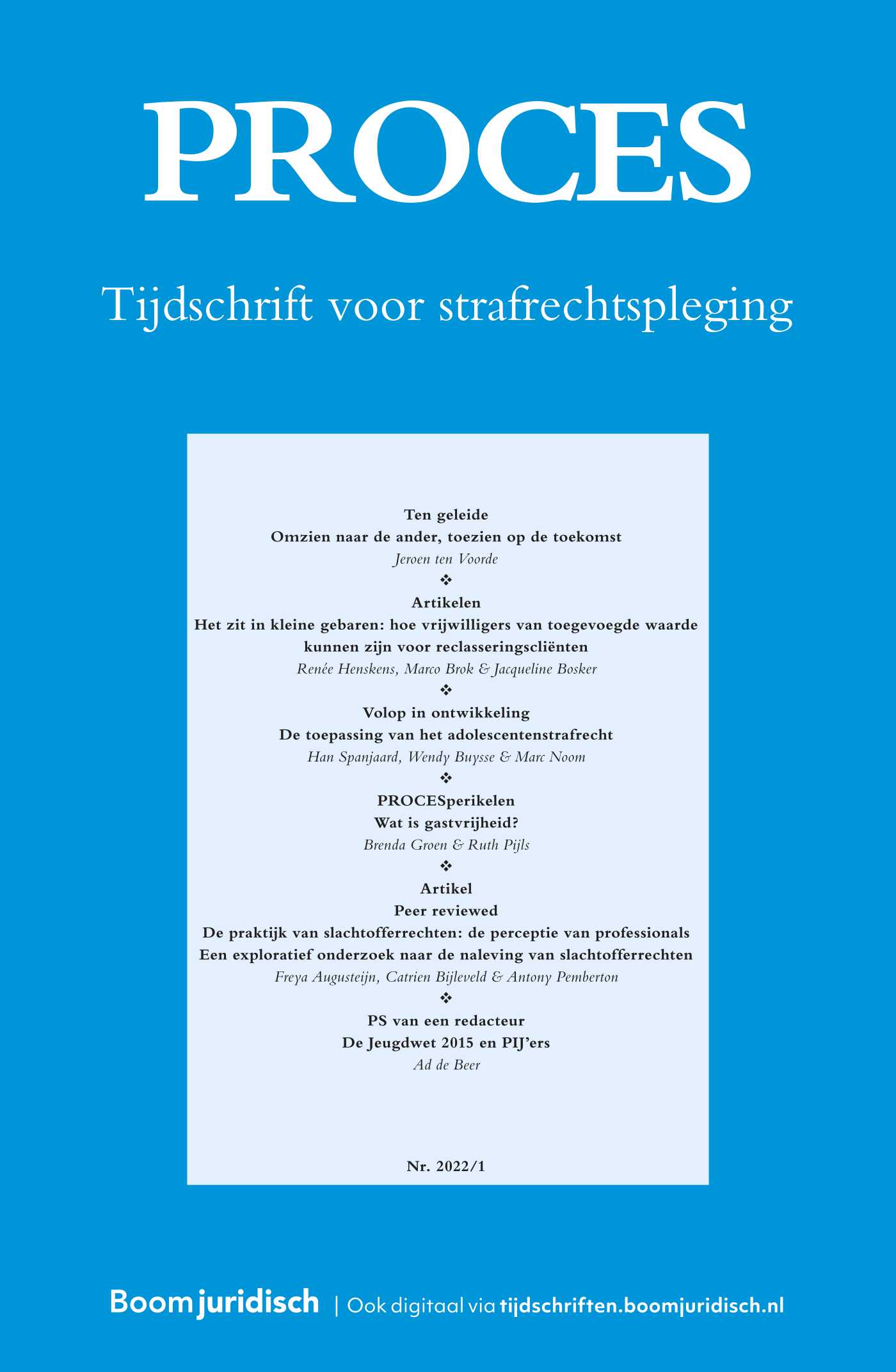|
Life in prison goes hand in hand with far-reaching restrictions in the personal autonomy of offenders. Lack of personal autonomy and the coercion to perform certain actions disrupt the ‘normal’ intrinsic experiences of voluntary action (i.e. sense of agency). Disturbances in the neurocognitive basis of voluntary action have a number of clear effects on human functioning, including self-reliance. This paper provides a first analysis of the relationship between personal autonomy and the intrinsic experience of voluntary action, and how this may be the key to understanding how freedom restrictions in detention can reduce self-reliance. |


PROCES
Meer op het gebied van Criminologie en veiligheid
Over dit tijdschriftMeld u zich hier aan voor de attendering op dit tijdschrift zodat u direct een mail ontvangt als er een nieuw digitaal nummer is verschenen en u de artikelen online kunt lezen.
| Ten geleide |
Prijs en waarde van veiligheidszorg en de rechtsstaat |
| Auteurs | Janine Janssen |
| Auteursinformatie |
| Artikel |
|
| Trefwoorden | Detentie, Autonomie, Zelfredzaamheid, Sense of agency |
| Auteurs | Josi Driessen, Renske Potgieter, Anja Dirkzwager e.a. |
| SamenvattingAuteursinformatie |
| Artikel |
Deelneming bij eergerelateerd geweld |
| Trefwoorden | daderschap, Deelneming, extended family |
| Auteurs | Janine Janssen, Jeroen ten Voorde, Femke Houben e.a. |
| SamenvattingAuteursinformatie |
|
In the Dutch public debate on honour-based violence on a regular basis this question is raised: should a special article be introduced for criminalising honour-based violence? However, it is striking that in this debate until now not much attention has been paid towards the different roles of family members in these violent conflicts. The main focus has always been on the so-called ‘material offender’, i.e. the offender that commits or threatens to commit a violent act. But what about family members that play a role in instigating this violence, the so-called ‘intellectual offenders’? In this article it is stated that in the Dutch context we should focus less on the introduction of new articles for punishing honour-based violence in the penal code and make better use of already existing laws and legal framework for addressing these severe violent acts. |
| PROCESperikelen |
Psychisch geweldVaak nauwelijks zichtbaar en niet expliciet strafbaar |
| Auteurs | Tako Engelfriet |
| Auteursinformatie |
| Artikel |
Beslissen over de verre toekomstReclasseringsadviezen aangaande de gedragsbeïnvloedende en vrijheidsbeperkende maatregel |
| Trefwoorden | gedragsbeïnvloedende en vrijheidsbeperkende maatregel, Reclasseringsadvies, langdurig toezicht |
| Auteurs | Tanja Jaarsveld en Jacqueline Bosker |
| SamenvattingAuteursinformatie |
|
In the Netherlands, the behavior-influencing and freedom-restricting measure (GVM) came into effect on 1 January 2018. The purpose of this measure is to enable long-term, if necessary, lifelong monitoring of perpetrators of sexual and serious violent crimes with a high risk of recidivism. The probation service advises on imposition and implementation of the measure. This article describes results of a small scale study on arguments that are used in practice to advise the GVM. The central question is whether the legislator provides probation officers with sufficient tools for substantiated advice to the court. |
| Artikel |
Boosheid, verdriet of walging?Een systematische literatuurreview naar de rol van emotie bij het effect van gruwelijk bewijsmateriaal op schuldbeslissingen |
| Trefwoorden | gruwelijk bewijs, emotie, schuldbeslissing, systematische literatuurreview |
| Auteurs | Dante Hoek, Janne van Doorn en Sigrid van Wingerden |
| SamenvattingAuteursinformatie |
|
Previous research has shown that gruesome evidence influences guilt decisions. Several scholars have put forward that the emotional response to gruesome evidence drives this effect. The current systematic review aims to critically scrutinize the current literature on this underlying emotion mechanism, by reviewing studies on the potential mediating role of emotion. A synthesis of the literature suggests that specific emotions have different effects: disgust shows a mediating effect, fear and sadness do not, whereas the effect of anger is inconsistent. The question remains whether an emotional effect is desirable in the courtroom. Recommendations for future research and the legal practice are made. |
| PS van een redacteur |
Plaatsing in de KVJJOnbekend maakt onbemind? Oefening baart kunst! |
| Auteurs | Coosje Peterse |
| Auteursinformatie |
| Call for papers |
PROCES Tijdschrift voor strafrechtspleging |

